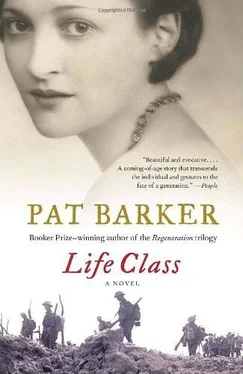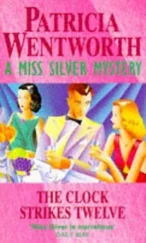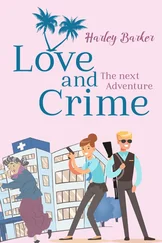‘I admire him, actually’ she said. ‘He’s the only person I know who kept going. Everybody else sat round and talked. Including me, I’m sorry to say.’ She glanced sidelong at him. ‘I suppose you’ve been too ill to do anything?’
‘No, I did a bit.’
‘And are you pleased with it?’
Oh, that artist’s question, both wanting and dreading to hear that another artist’s work is going well.
‘I am, quite.’
‘Oh, good.’
This was the longest walk he’d done for quite a while, and he was pleased at the way his chest was holding up. It helped that the air was warm and slightly moist. They strolled on, leaning against each other now. The conversation flowed, but it was the conversation of friends and he wanted to change that. He needed to tell Elinor how he felt about her, even if it caused her to withdraw, and it probably would. Teresa had vanished almost without trace. Little remained of her now except a voice saying, ‘You don’t love me. If you love anybody, you love Elinor, and you only love her because you know she won’t have you.’ In his memory, even that remark had been pruned. ‘You don’t love me. You love Elinor.’ That was what he remembered her saying because that was what he wished she’d said.
‘Shall we have a walk round?’ he said, as they were passing Russell Square.
‘I thought we were walking? Miles.’
‘Let’s sit down, then.’
Further in under the darkness of the trees he slipped his arm around her waist. He could feel the rise and fall of her breath. Their footsteps rang out on the path with that hollow sound of night-time in the city. Veering to one side, he steered her on to the grass. Now there was only the rustling of leaves under their feet, the sharp smell of soil and decay. The searchlights were clearer now, sweeping from side to side above their heads.
‘Neville’s painted them, you know. The searchlights.’
Bugger Neville. ‘I bet he has.’
Before she could speak again he covered her mouth with his own. He could see hands, frozen in the air. At last, with a sigh, she let them settle on his shoulders. He stood with his back to a tree, holding her close, wanting to laugh and shout with triumph, simply because she hadn’t pushed him away. Everything was possible now. He whispered in her ear, ‘I love you.’
She was looking up at him. He saw the searchlights in her eyes, and pulled her deeper into the shade. He started to kiss her neck, then her throat, his hand closed around her breast and then she was pushing him away. Breathing deeply, eyes closed, he heard a creaking sound. He looked up thinking it must be a bough, but although the tree was in constant motion in the upper branches, the sound seemed to be coming from further away.
‘What is that?’
‘I don’t know.’
Taking her hand, he led her towards it. Far from them being alone, as he’d thought at first, he realized the square was full of couples, entwined together in the shadows of the trees or stretched out full length on the ground. One couple were making love. As he walked past he glimpsed an elastic garter, a stocking top and a bulging white thigh.
The sound came from near the centre of the square. He could see what was causing it: a line of cylindrical black shapes suspended from a metal frame, swaying in the wind and causing the ropes they were suspended from to creak. Elinor walked up to them and he followed.
‘What are they?’ he asked.
He caught the glint of her teeth as she smiled.
‘It’s the Kaiser.’
She turned one of the bags round to face him and he saw that a ferociously glaring mask had been pinned to the cloth. They were just straw-filled sacks, used for bayonet practice, weighted so they wouldn’t move too easily. Pale gold straw bled from rents in the material.
‘I watched them practising the other day. They’re supposed to yell when they stick it in.’ She pulled a face. ‘Apparently nobody dies unless you yell.’
She went along the line, setting them all in motion, one by one. The snarling faces jiggled and turned.
He felt the evening start to slip away from him. As she turned, he tried to kiss her again, but his kiss landed on her ear. ‘Can we go to your lodgings?’
Her hands had come up to form a barrier. ‘I don’t think so.’
‘Can I see you tomorrow, then?’
‘Yes, that would be nice.’
He relaxed. She wasn’t rejecting him. She just needed time. He guessed that glimpse of the girl with her skirt around her waist had frightened her as much as it had aroused him.
‘Where would you like to go?’
‘Anywhere,’ she said. ‘As long as it’s not the Café Royal.’
They laughed, and their laughter restored a kind of normality. Turning their backs on the straw men dangling from their gibbet, they began to walk towards Gower Street.
His hand settled on her waist. Till now he’d intended to stay in London only till the day after tomorrow, but now he thought he’d stay longer, make it a full week.
A lot could happen in a week.
Everything stinks: creosote, bleach, disinfectant, soil, blood, gangrene.
The military authorities say uniforms must be preserved at all costs, but that means manhandling patients who are in agony. Cut them off, says Sister Byrd, and she’s the voice of authority here, in the Salle d’Attente, not some gold-braid-encrusted crustacean miles away from blood and pain, so cut they do, snip, snip, snip, snip, as close to the skin as they dare.
On either side of Paul as he cuts are two long rows of feet: yellow, strong, calloused, scarred where blisters have formed and burst repeatedly. Since August they’ve done a lot of marching, these feet, and all their marching has brought them to this one place.
Sister Byrd’s tough, tougher even than she looks. Auburn hair tarnished with silver; fine, pale skin mottled red on the cheeks; harebell-blue eyes — she must have been pretty once — but now she’s barrel-shaped and dour, and amazingly good at her job.
Every few minutes the door’s pushed open and the stretcher-bearers shuffle in with their load, standing like carthorses between the shafts, waiting to be told where to set it down. They’re there now, waiting. Sister Byrd pulls the blanket over the face of a man who’s just died and his yellow ankles seem to get longer. Strong calves appear, fuzzed with black hairs, the muscles prominent from all the marching he’s done in the last few weeks. She bows her head, but only for a second. All right,’ she says, in French. ‘You can put him here.’
In bad weather, as now, the rain pelts down on the corrugated-iron roof with the rattle of machine-gun fire. At the moment it’s a real downpour. Waking from their half-sleep, the bundles in the blankets began to stir and cry out in fear. One of the head wounds throws off his blanket, clambers to his feet and, naked, runs between the rows of beds. Two of the orderlies give chase and eventually grab hold of him, one by each arm, and hold him like that, his arms outstretched, a blood-soaked bandage slipping down across one eye. They soothe him, stroke his arms, tell him there’s nothing to be frightened of, it’s the rain, only the rain, no guns here, and perhaps he believes them, but more probably he doesn’t understand a word, only the tone of voice and the touch. But he lets himself be led along, the strength that terror gave him ebbing with every step, until, by the time they reach his bed, he’s walking with the slow, shuffling steps of a very old man.
At last Sister Byrd signals that it’s Paul’s turn for a break. They drink their cocoa in the sterilizing room, all of them, dressers, orderlies, nurses, surgeons, surrounded by hissing and bursts of steam. The cocoa’s hot. It delineates his gullet as it goes down. Only his hands around the mug and the hot fluid in his mouth and stomach are real. The light over the dressing table blurs; he makes an effort to straighten up and focus on his surroundings. Swaying on his feet, and still four more hours to do. Sister Roper’s saying something to him. He has to strain to hear her quiet voice above the roar and hiss of the boiler. Somebody new, a volunteer, arriving on the eight o’clock train. Will he go and meet him? ‘Take him to the huts first — he’ll have luggage with him, I expect.’
Читать дальше












